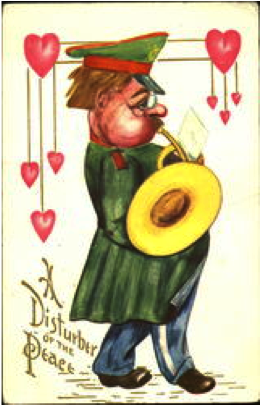 School name: University of West Florida
School name: University of West Florida
Type of college/university: Regional Comprehensive University
School locale: Pensacola, Florida, a military-friendly, tourist-oriented, and historically significant town (oldest American settlement in America) on the Gulf Coast {This “oldest settlement” is a controversial issue since the Pcola settlers got wiped out by a hurricane giving final honors to St. Augustine Florida for oldest continuous settlement in America}.
Classes you teach (current): I’m returning to the classroom in the fall after ten years of service as a dean during which time I still taught honors introductory psychology. I will be teaching Honors Introductory Psychology and, for the first time, Positive Psychology.
What’s the best advice about teaching you’ve ever received?
When you don’t know something, don’t fake it. Turn it into a critical thinking moment and have the class speculate about how to answer the question. If possible, come back with expert opinion in the next class. This gem and many others from Bill McKeachie.
What book or article has shaped your work as a psychology teacher?
The fabulous Teaching Tips by the fabulous Bill McKeachie. I discovered the book in my first year of teaching and practically slept with it under my pillow.
Tell us about your favorite lecture topic or course to teach.
I most enjoy teaching intro and have done so for nearly every year in my career. The reason I like it so much is that it gives me an opportunity to capture the most suited students for the major and also enlighten those who are not suited to the major to figure some other honorable ways to meet their career goals. In this class, more than any other, students are capable of surprise and open to changing how they think.
Describe a favorite in-class activity or assignment.
I love an ice-breaker activity that I think I originally learned from Norine Jalbert. In intro I want students to understand the difference between describing behavior and inferring meaning from that behavior, a fundamental goal of intro that often gets neglected. To do that, I provide a list of several multiple choice questions about me that they must determine the right answer to merely from observation and intuition. An example would be, “Who has kissed me on the cheek? The Governor, Denzel Washington, Steve Martin, or a member of Monty Python.” They must generate a hypothesis, commit to it by holding up a color coded for the appropriate answer, and then engage in vigorous defense. It is a great way to illustrate hypothesis generation, the nature of evidence, and confidence in judgment, as well as allow students a little glimpse into me and my eccentricities. By the way, the answer is Terry Jones of Monty Python. Twice!
What teaching and learning techniques work best for you?
Although I enjoy traditional test construction, I prefer the long-lasting learning effects (“velcro learning”) offered by authentic assessment strategies. An example is the final exam I have historically given in intro psych. I rearrange chapters so that I conclude the course with personality, abnormal, and treatment. The final takes place on the last formal day of class. I recruit a former student from the class to role-play a famous deceased person with mental health problems of the person’s choosing (e.g., Sylvia Plath, Zelda Fitzgerald, Emily Dickinson, Kurt Cobain). The class serves as an interviewing body with the obligation of coming up with an explanation of how the problems derived, a tentative diagnosis, and a provisional treatment plan. There are some reliable outcomes from this event. The class explodes with questions. Despite my warnings, students get sucked into personal judgment rather than professional questioning. Someone usually asks if it is “okay” to do additional research. Typically, a student volunteers for the next class’s experience. Instead of meeting to take a final, the class returns to discuss why their answers didn’t agree and what that means about the nature of the discipline. We then switch to discussing the experience of the course itself, returning to the syllabus and talking about ways their thinking should have changed. This arrangement allows me to end the class properly, a pedagogical necessity I learned from Neil Lutsky.
 What’s your workspace like?
What’s your workspace like?
I’m currently moving into a new workspace after surrendering the luxurious digs of the dean’s office. As the most senior member of the psychology department, I was offered a double sized office with lots of project and discussion space, bookshelves, and rooms for cherished artifacts collected over a long and satisfying career. I have what one of my colleagues calls the “I Love Me” wall filled with diplomas, plaques, and tributes. I also have a Mary Englebreit poster (“Don’t Look Back”) featured prominently to remind me about the excitement that looms head. I’m exquisitely lucky, knowing how little space most faculty typically have. I do not have a separate lab as most of my colleagues do since my scholarship doesn’t usually involve data generation.
Three words that best describe your teaching style.
Passionate, fair, funny
 What is your teaching philosophy in 8 words or fewer?
What is your teaching philosophy in 8 words or fewer?
I am a disturber of the peace (see photo)
Tell us about a teaching disaster (or embarrassment) you’ve had.
My favorite embarrassment story happened when I was teaching a large intro class at the University of Wisconsin-Milwaukee as an adjunct very early in my career. My dread zone (we all have one) in intro is S&P. Physics and I are just not on good terms and I always need to rehearse the basics to get through. For some reason, this particular large class showed the spunk and curiosity that I claim to love but they peppered me with questions that I didn’t have the first clue how to answer. For example, “Why do we see ourselves upside down in a spoon?” I didn’t know we did, let alone know how to explain it. “Why do car wheels appear to be turning the wrong way in movies?” They ultimately came up with an array of “stump the prof” questions to which I confessed both ignorance and amazement. I promised to and did come up with viable explanations in the next class. Because I am regularly the star of my own show on God’s comedy channel, that class just happened to be the class my brand new husband visited to watch me in action. Mortifying. It was an especially big Dufus Day but it certainly taught me not to be afraid of student curiosity.
What is something your students would be surprised to learn about you?
This gets more surprising to students as I get older, but I’m a Big T Personality. I like scary rides, have driven my own motorcycle, and used to be a glider pilot.
What are you currently reading for pleasure?
I just finished David Sedaris’ Naked. I am about to start The Book Thief.
What tech tool could you not live without?
Powerpoint. I love being able to blend images with bulleted text to make the key ideas more memorable. Powerpoint has maximized the artistry of my teaching.
What’s your hallway chatter like? What do you talk to colleagues about most?
It saddens me to say that the most animated conversation tends to come about in relation to student misbehavior - the newest strategy for cheating, the most outrageous incivility, the often expressed wish that our current students could be as good as we were. We are such deluded romantics!
PSYCHSESSIONS UPDATE: Listen to Jane talk with Garth Neufeld back in 2019 about intro. psych - you will get inspired (or re-inspired!) to teach!
https://psychsessionspodcast.libsyn.com/e068-intropsychsessions6-jane-halonen-from-the-university-of-west-florida
BONUS 2ND PSYCHSESSIONS UPDATE: In this 2nd PsychSessions episode, Jane argues (sorta) with Eric Landrum about assessment. Fun!
https://psychsessionspodcast.libsyn.com/website/e096-jane-halonen-part-2-formidable-generous-industrious-sovereign-ruler-of-janeland
